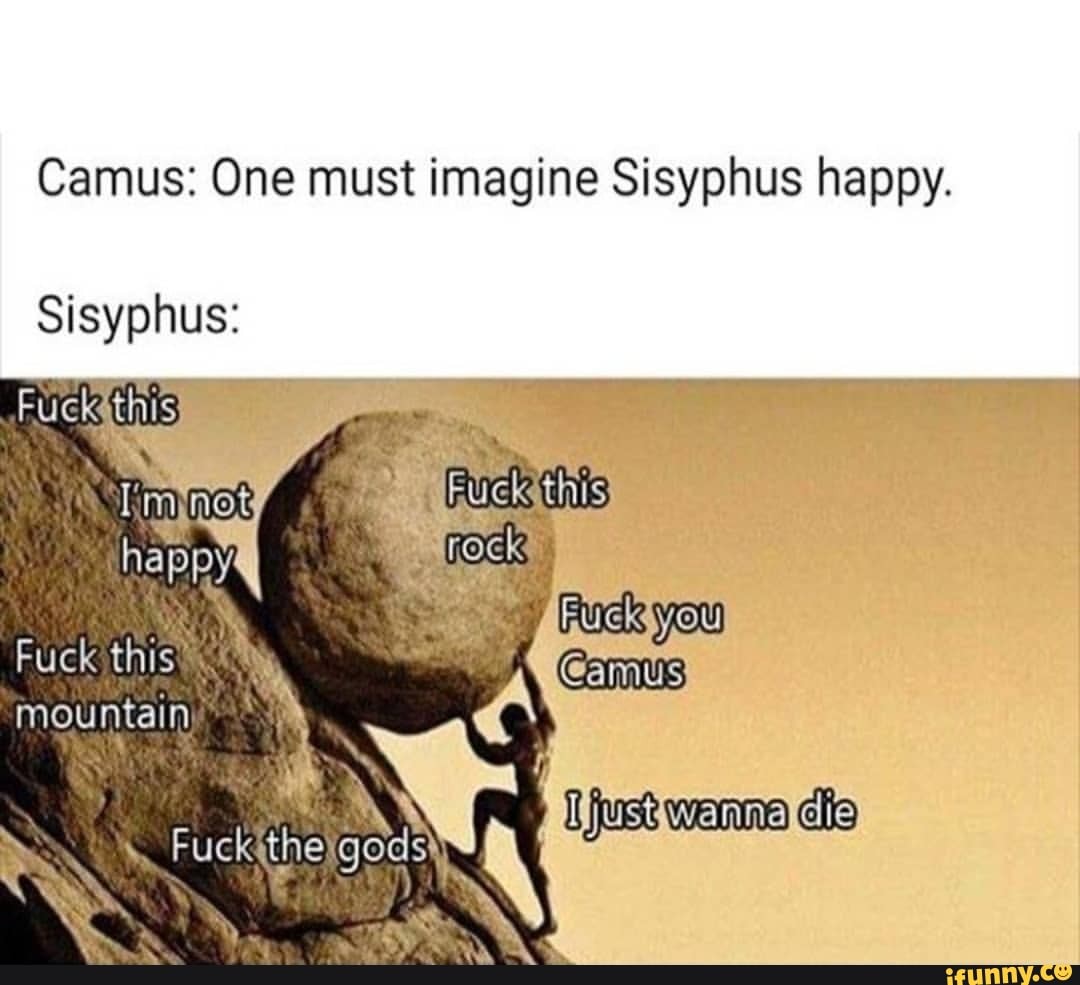In our society, one that teems with parasitic behavior between its individual members, yes, it raises a question why we might want to live without higher meaning. Sartre didn't address it until late in life, but Camus recognize that most people at least commit philosophical suicide (that is, take a leap of faith) if the choice is between that or committing literal suicide. It's why he offers embracing the absurd, imagining Sisyphus happy, and finding a way to get there, yourself.
To be fair, I'm not even there yet, finding that my society has willfully betrayed me from my childhood (as it does for all kids in the US) trying to create an obedient and disposable laborer / soldier to build vanity projects for billionaires, rather than prepare us to shape society the way we want it as we grow into it. Ours is now a gerontocracy as well as a plutocracy, while the kids have their own ideas and are looking to defy the natural social order.
So my story and yours is in how we break free from the fetters and find our own way. Or not, as the case may be.
You won't ever be able to overcome the ills of society alone, by yourself you'll never be able to "break free from the fetters and find your own way" Making a better society requires coordinated collective effort. Religion bonds people together in a very rare way. You can't get people to work together in a coordinated way without some ideal in their minds, they have to believe that their effort might not help themselves directly but might help make future civilization a better place. That takes faith of one kind or another.
Here's the context of that sentence that you are quoting: "You can’t get people to work together in a coordinated way without some ideal in their minds, they have to believe that their effort might not help themselves directly but might help make future civilization a better place. That takes faith of one kind or another."
I was talking about getting people to work together for a better world, not an individual choice"
It's very tangible. Quantifiable even. Higher literacy rates. Lower teen pregnancy. Higher incomes. Longer lifespans. Lower carbon emissions. And so on.
In our society, one that teems with parasitic behavior between its individual members, yes, it raises a question why we might want to live without higher meaning. Sartre didn't address it until late in life, but Camus recognize that most people at least commit philosophical suicide (that is, take a leap of faith) if the choice is between that or committing literal suicide. It's why he offers embracing the absurd, imagining Sisyphus happy, and finding a way to get there, yourself.
To be fair, I'm not even there yet, finding that my society has willfully betrayed me from my childhood (as it does for all kids in the US) trying to create an obedient and disposable laborer / soldier to build vanity projects for billionaires, rather than prepare us to shape society the way we want it as we grow into it. Ours is now a gerontocracy as well as a plutocracy, while the kids have their own ideas and are looking to defy the natural social order.
So my story and yours is in how we break free from the fetters and find our own way. Or not, as the case may be.
Fuck Camus.
I don't really know anyone who lives life for some higher meaning. The people I see are just trying to get through the week.
You won't ever be able to overcome the ills of society alone, by yourself you'll never be able to "break free from the fetters and find your own way" Making a better society requires coordinated collective effort. Religion bonds people together in a very rare way. You can't get people to work together in a coordinated way without some ideal in their minds, they have to believe that their effort might not help themselves directly but might help make future civilization a better place. That takes faith of one kind or another.
Bullshit. You can choose any number of career or volunteer paths that demonstrably help people or society without needing any "faith".
Here's the context of that sentence that you are quoting: "You can’t get people to work together in a coordinated way without some ideal in their minds, they have to believe that their effort might not help themselves directly but might help make future civilization a better place. That takes faith of one kind or another."
I was talking about getting people to work together for a better world, not an individual choice"
Loads of people work together for the betterment of mankind without any sort of faith.
"the betterment of mankind" is an intangible idea that you are choosing to believe in. That's faith.
It's very tangible. Quantifiable even. Higher literacy rates. Lower teen pregnancy. Higher incomes. Longer lifespans. Lower carbon emissions. And so on.
It's called brainwashing.